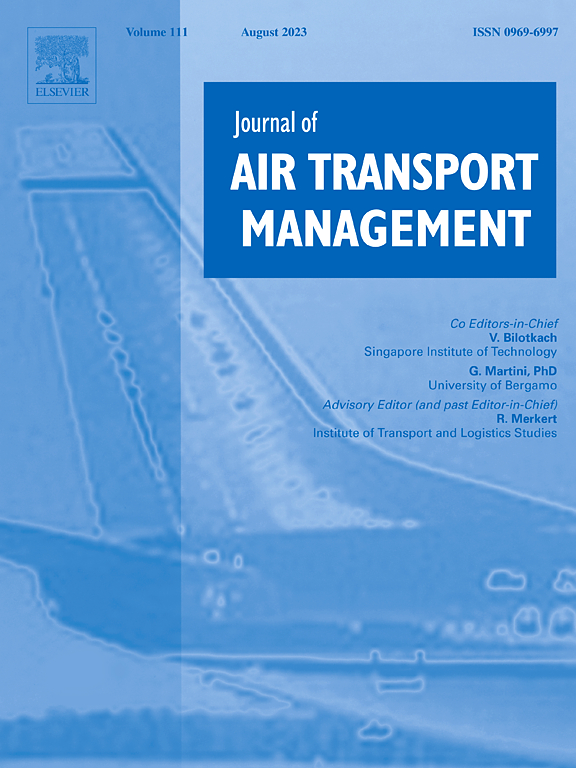At the crossroads of competition, cooperation, and integration: The airline M&A
IF 3.6
2区 工程技术
Q2 TRANSPORTATION
引用次数: 0
Abstract
There have been many airline mergers and acquisitions (M&As) over the years to cope with the competitive air transport market. It is common for merging airlines to integrate post-M&A because it can increase efficiency and reduce costs through economies of scale and the elimination of duplicate services. However, they may also compete or cooperate as separated companies for reasons such as damaging brand value or clashing corporate cultures. Meanwhile, airline M&A requires approval from aviation authorities of several countries to prevent negative impacts on consumer welfare. This approval may be conditioned on the revoke of traffic rights or the slot reallocation. This study investigates the operation strategies of airlines -two merging airlines and rival airlines-operated at certain flight-leg based on game theory considering the approval conditions. The results show that airline M&As can lead to more profit by reducing competition. However, there is insufficient evidence that it is more profitable for two airlines to integrate than to cooperate. The key is how much the acquiring airline can absorb the passenger demand of the defunct airline through integration. After the M&A, customers would face higher airfares, but it cannot be concluded that customers are disadvantaged. This is because the increase in the number of flights may lead to a wider range of choices for customers. On the contrary, slot reallocation to prevent monopolies may harm consumer welfare. It is hoped that the managerial insights from this study will be helpful to practitioners concerned with post-M&A airline strategies.
在竞争、合作与整合的十字路口:航空公司并购
多年来,为了应对竞争激烈的航空运输市场,航空公司进行了多次并购。合并后的航空公司在并购后进行整合是很常见的,因为它可以通过规模经济和消除重复服务来提高效率和降低成本。然而,由于品牌价值受损或企业文化冲突等原因,它们也可能作为独立的公司竞争或合作。同时,为了防止对消费者福利产生负面影响,航空公司并购需要得到多个国家航空主管部门的批准。此批准可能以撤销通行权或重新分配时隙为条件。本文基于博弈论,在考虑审批条件的情况下,对两家合并航空公司和竞争航空公司在特定航段的运营策略进行了研究。结果表明,航空公司的并购可以通过减少竞争来获得更多的利润。然而,没有足够的证据表明两家航空公司合并比合作更有利可图。关键是收购方通过整合能吸收多少倒闭航空公司的乘客需求。在M&;A之后,客户将面临更高的机票价格,但不能得出客户处于不利地位的结论。这是因为航班数量的增加可能会给顾客带来更广泛的选择。相反,为了防止垄断而重新分配时段可能会损害消费者的福利。希望本研究的管理见解能对关注并购后航空公司战略的从业者有所帮助。
本文章由计算机程序翻译,如有差异,请以英文原文为准。
求助全文
约1分钟内获得全文
求助全文
来源期刊

Journal of Air Transport Management
TRANSPORTATION-
CiteScore
12.40
自引率
11.70%
发文量
97
期刊介绍:
The Journal of Air Transport Management (JATM) sets out to address, through high quality research articles and authoritative commentary, the major economic, management and policy issues facing the air transport industry today. It offers practitioners and academics an international and dynamic forum for analysis and discussion of these issues, linking research and practice and stimulating interaction between the two. The refereed papers in the journal cover all the major sectors of the industry (airlines, airports, air traffic management) as well as related areas such as tourism management and logistics. Papers are blind reviewed, normally by two referees, chosen for their specialist knowledge. The journal provides independent, original and rigorous analysis in the areas of: • Policy, regulation and law • Strategy • Operations • Marketing • Economics and finance • Sustainability
 求助内容:
求助内容: 应助结果提醒方式:
应助结果提醒方式:


